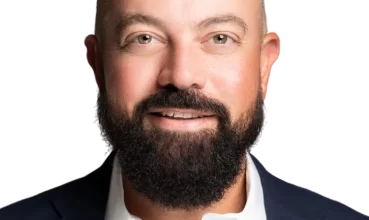After nine years in the Marine Corps, David Kurz found himself searching for his place in civilian life. What began as an exploratory venture into real estate has evolved into a 19-year jour...
Alex Wolking's Specialized Approach to Marketing Challenging Properties




“If Grey Gardens was in the Midwest, I probably would have listed it and sold it.” – Alex Wolking, Keller Williams ONEChicago
In a real estate landscape increasingly filled with massive teams and social media personalities, Alex Wolking has developed a distinctive niche that few would willingly choose: selling the properties nobody else can. With his small team at Keller Williams ONEChicago, Wolking has built his reputation on turning real estate challenges into success stories.
A Real Estate Legacy
For Wolking, real estate isn’t just a career—it’s in his DNA. The son of a 32-year industry veteran, his path was clear from an astonishingly young age.
“I started working for my dad when I was twelve,” Wolking recalls. “There were two things that happened in one week that hooked me.”
First, he witnessed his father help a single mother buy her first home. “I saw this other side of my dad that was just fascinating,” he says. “He became like a different person—very protective, very much an advocate and teacher. I was very inspired by that.”
Days later, his father asked him to log into the MLS and print a listing sheet. “I came back in the house and just played on the MLS for hours. I was hooked.”
This early exposure sparked a passion that would define his life. Soon, the twelve-year-old Wolking was biking to open houses around his neighborhood, teaching himself the market. “I would have agents coming into my dad’s office to talk to me, not to him, asking ‘Have you been to this? Have you been to that one?'”
Fast forward to today, and that same curiosity remains. “I still do it twenty years later,” Wolking says. “That’s just been my life.”
Handcrafted Real Estate
Where many brokers aim for volume, Wolking takes pride in his boutique approach. “We’re small but mighty,” he explains of his three-person team that includes a full-time administrative assistant and a marketing assistant who handles social media, newsletters, and marketing materials.
The results speak for themselves: “Last year we sold 40 homes for $32 million with just two people,” Wolking notes, pointing out their impressive $800,000 average sales price—significantly above the Chicago market average.
What’s their secret? “I like to think of ourselves as handcrafted real estate. It’s very much personal attention on each of our clients. They’re not going to get passed around from one team member to the next.”
This artisanal approach extends to their preparation process. Whether it’s a high-rise condo or a single-family home, Wolking’s team dives deep into every property they represent.
“If it’s a condo in a high-rise building, we know everything about that association—all the projects going on, the financials, down to the last detail. If it’s a single-family home, we know when the last time the dust filter was changed,” he explains. “I like to prep my listings like we’re getting ready for the Olympics.”
Solving the Unsolvable
Where Wolking truly shines is with properties that other brokers consider lost causes—mansions with astronomical property taxes, historic properties tangled in regulatory red tape, or listings that have languished on the market for years.
“I usually get a lot of these big ten, fifteen, twenty thousand square-foot listings that need a bunch of work,” Wolking says. “When I used to sell real estate in the Quad Cities, the joke was: if it’s over a hundred years old and over five thousand square feet, chances are Wolking either listed it, sold it, or showed it five times.”
His current portfolio includes properties that would intimidate most agents: a home with $200,000 annual property taxes, the historic Isley Mansion with a tax bill of $256,000 per year, and a property on Chicago’s Billionaire’s Row that had been on the market for ten years with three other brokers before Wolking took it on.
His approach to these challenges is methodical: “It’s my ability to listen. I listen closely, I can understand the nuances of a property.” For particularly difficult properties, he’ll “spend a couple hours if I’ve got the time, or I’ll make time… sitting with it, picking it apart, until I solve it.”
The solutions are often unconventional. When he had NFL star Brian Urlacher’s 12,000-square-foot house on nine acres during the pandemic lockdown, Wolking pivoted: “Let’s put it up for rent as a summer rental, fully furnished during the pandemic.” He sent it to ESPN and received 14 rental applications from people desperate to escape the city.
For other challenging properties, he’s employed “reverse offers,” where the seller makes an offer to an interested buyer rather than waiting for them to act. He’s coordinated with political officials to cut red tape on landmark properties and created detailed contractor estimates to help buyers envision renovating derelict mansions.
“You have to constantly think outside the box,” Wolking explains. “What I enjoy is the problem-solving and the thrill of the hunt.”
Market Insights: The Return to Urban Living
After several years of pandemic-driven suburban migration, Wolking is witnessing a notable shift back to city centers. “I’m starting to see inventory come on the market finally, slowly but surely,” he observes. “It’s a lot of these people who bought in 2020-2021 and they just had a life circumstance change.”
Despite the golden handcuffs of 3% interest rates, many who fled cities during COVID are finding suburban life less appealing than anticipated. “They moved out to the suburbs and you can only go to Applebee’s so many times before you get annoyed with it,” Wolking quips.
He’s seeing increased desire for walkable urban environments: “People want to spend their time having fun. They’re simplifying their life and going somewhere that’s got more space outdoors and things to do.”
This trend has revitalized previously struggling downtown markets. “The downtown in Chicago south of North Avenue—Gold Coast, Streeterville, River North—you couldn’t give those condos away the last five years. Now you can,” Wolking says. “People want a place in the city where they can just walk outside the door and have coffee shops and restaurants and nightlife and theaters to go to. They don’t want to be in the car all day.”
The Evolving Role of Real Estate Agents
With information readily available online, Wolking acknowledges that the agent’s role has fundamentally changed. “Consumers can go online and find their property. They have the same information that real estate agents do. Real estate agents are no longer the gatekeepers of the MLS and the listings like they used to be.”
Instead, today’s agents must provide expertise and interpretation. “Now, consumers have so much information at their fingertips, they don’t know what to do with it. They don’t know what it means. They need someone to be their interpreter and their advocate.”
The Future of Chicago Real Estate
Looking ahead to 2025, Wolking is optimistic about the market, particularly for single-family homes in the city.
“If you’ve got a house to sell in the city of Chicago, now is the time—especially a single-family home under two million dollars. My God, those people are doing extremely well,” he emphasizes. “There is no inventory.”
The demand comes from urbanites who want more space but refuse to leave the city: “They don’t want to move to the suburbs, they don’t want the commute, they don’t want the traffic. They want to stay in the city, and trying to find a single-family home in a top-notch neighborhood—you can’t find it. And when they do come on, they get snapped up with tons of offers.”
This represents a remarkable shift from recent years: “You couldn’t give a single family home away over 1.5 [million], now you can’t get them on the market fast enough.”
Beyond Image to Expertise
While social media presence often overshadows substance in today’s market, Wolking focuses on expertise rather than image. His sustainable relationship-building approach contrasts with flashy marketing tactics.
“I have clients that I stay in touch with to this day. I have one client that still sends me funny memes and videos on Instagram, and I sold her condo five years ago. I know my clients’ kids’ names, their dogs’ names. I’m not just some salesperson—I become part of the family.”
This combination of relationship-focused service and innovative problem-solving creates a resilience that transcends market fluctuations. For Alex Wolking, real estate remains what it has always been since those childhood days exploring open houses on his bicycle: a family business built on relationships, expertise, and the thrill of solving the unsolvable.
Alex Wolking can be reached through Keller Williams ONEChicago for listings both big and small throughout the Chicago area.
Similar Articles
Explore similar articles from Our Team of Experts.


“My early professional years were about absorbing every detail of the market,” says Brandon Charnas, co-founder of Current Real Estate Advisors, describing his career trajectory before l...


In the competitive world of South Florida real estate, adaptability and a diverse skill set are key to success. For Marie Gonneville, the Co-Owner of Engel & Völkers Pompano Beach, her ...


In the competitive world of real estate lending, We Lend has emerged as a standout success story, funding over $600 million across 1,300 assets with zero principal loss since its founding in...


Few legal professionals can claim real estate is truly in their blood, but for Sam Spiritos, Managing Shareholder at Shulman Rogers, it’s a heritage that spans generations. His grandfa...




